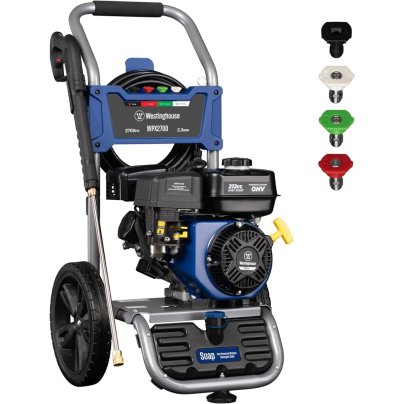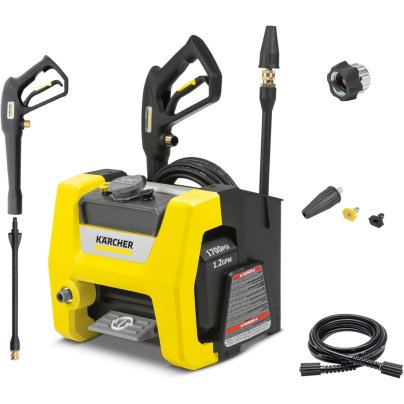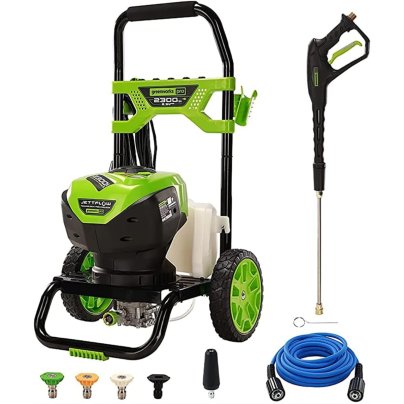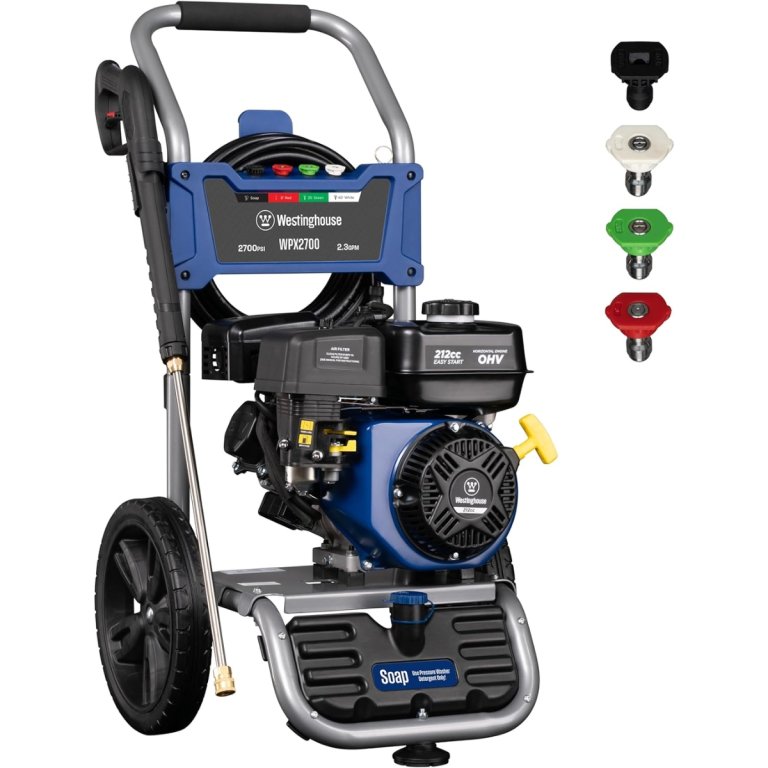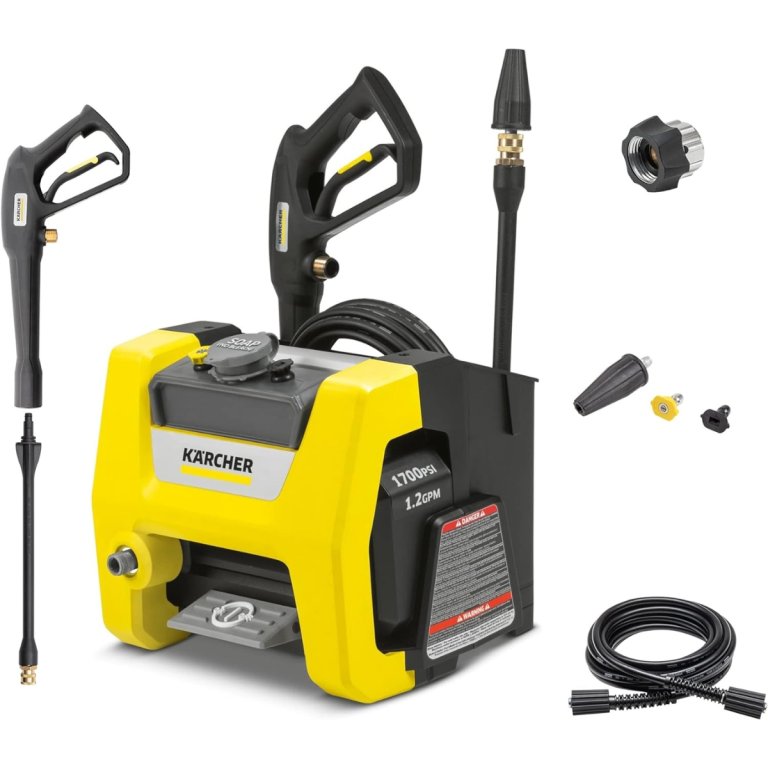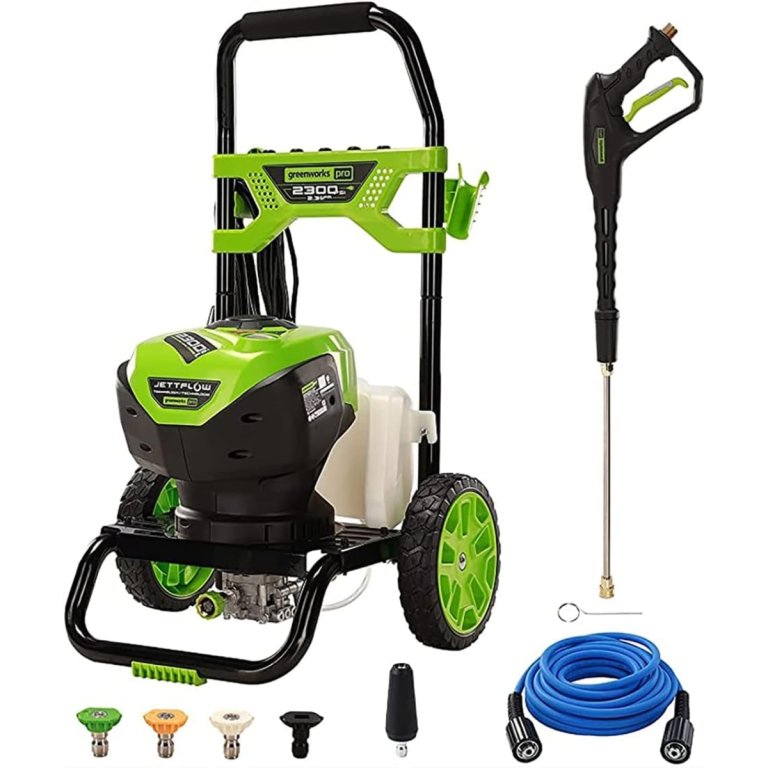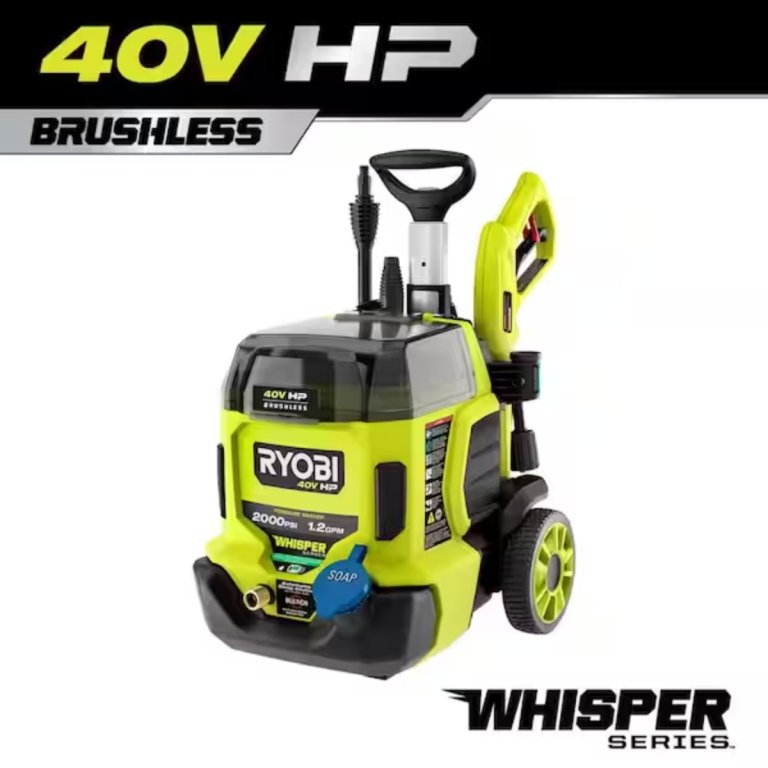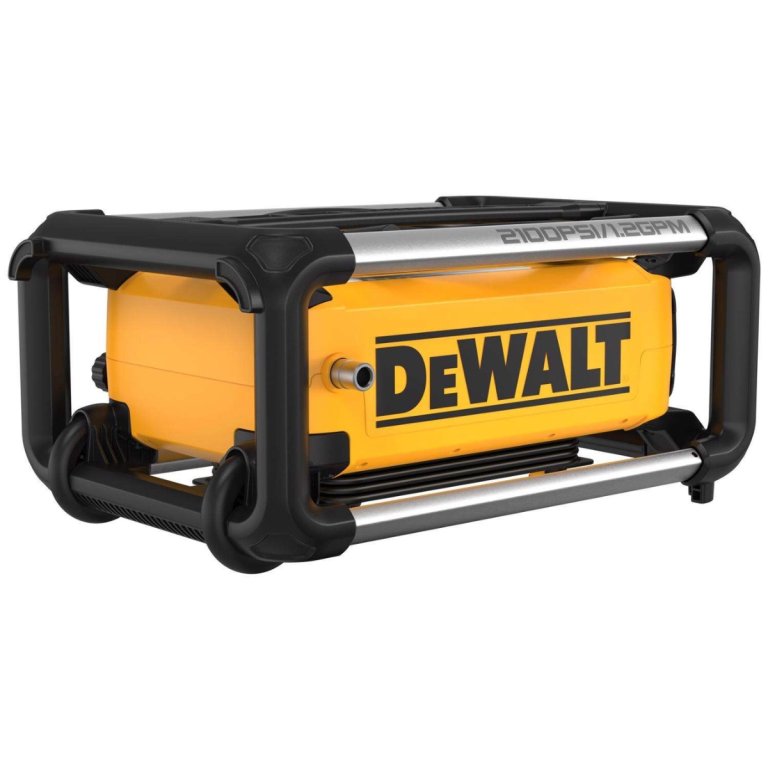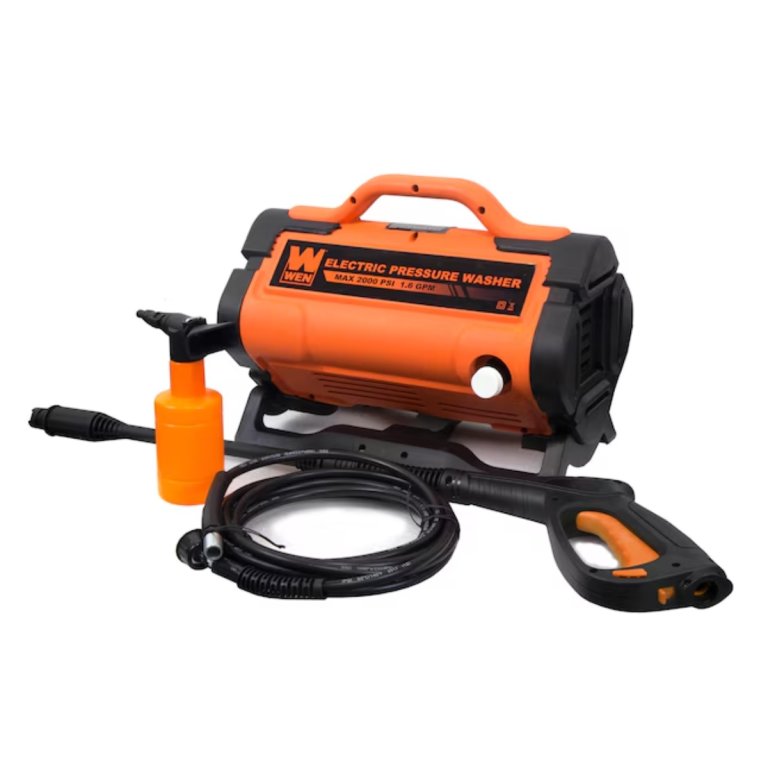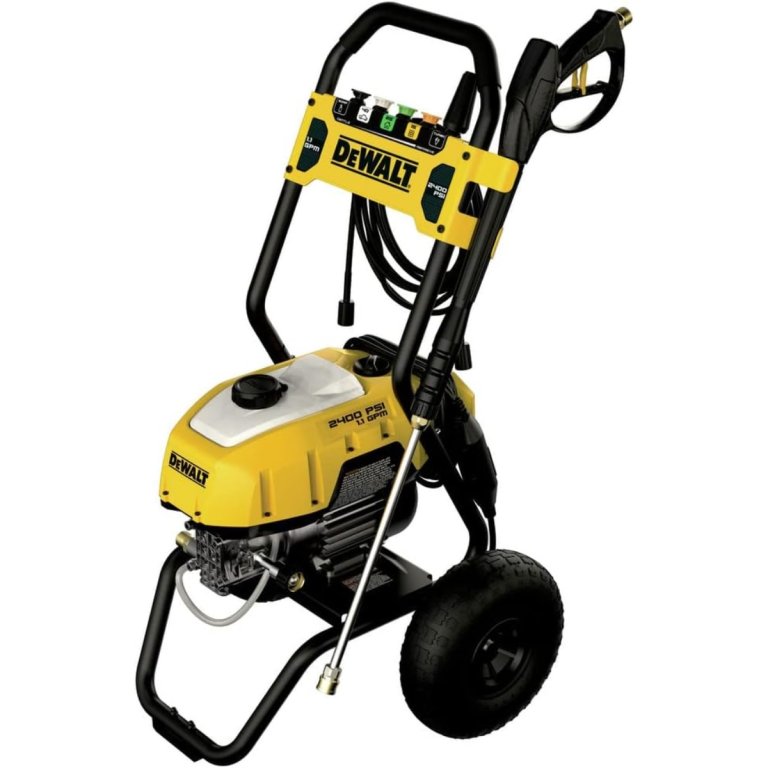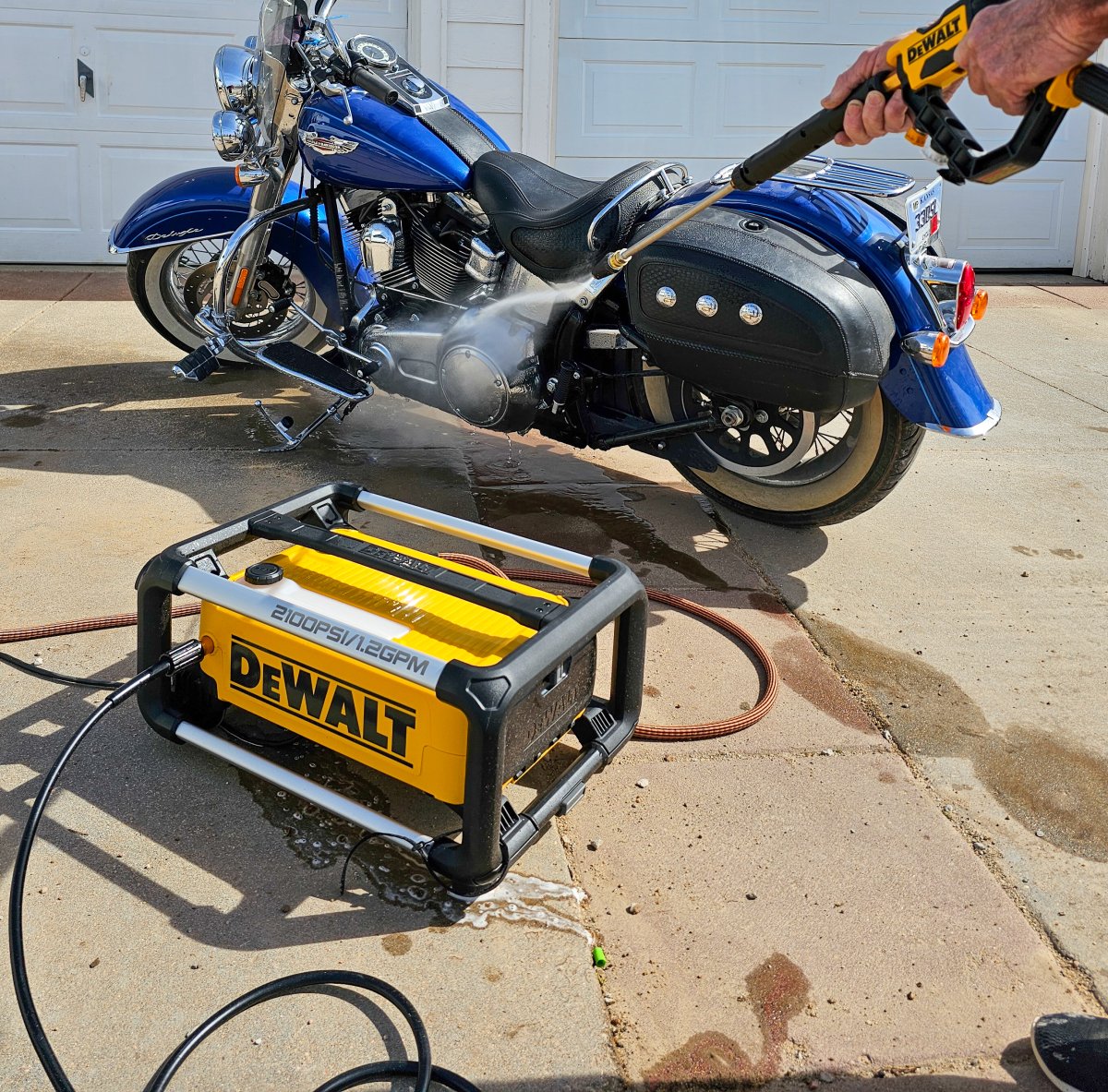
We may earn revenue from the products available on this page and participate in affiliate programs. Learn More ›
With the ability to deliver a spray of water 30 to 80 times more powerful than that of a garden hose, a pressure washer under $500 can be an effective way to tackle big cleaning tasks. However, not all machines provide exceptional results, so we tested 19 of the best-selling pressure washers to see how well they performed.
Based on tests, our favorite is the Westinghouse WPX2700 for its durability, versatility, and, of course, cleaning power. Read on to learn what makes these products the best in their price range. Plus, check out a breakdown of what you need to know while shopping for the best pressure washer under $500.
- BEST OVERALL: Westinghouse WPX2700 Pressure Washer
↓ Jump to Review - BEST BANG FOR THE BUCK: Karcher K1700 Cube Electric Pressure Washer
↓ Jump to Review - BEST ELECTRIC: Greenworks 2,300 PSI 2.3 GPM Electric Pressure Washer
↓ Jump to Review - BEST CORDLESS: Ryobi 2,000 PSI 1.2 GPM Electric Pressure Washer
↓ Jump to Review - BEST PORTABLE: DeWalt DWPW2100 Electric Jobsite Pressure Washer
↓ Jump to Review - BEST COMPACT: Wen PW1900 2,000 PSI 1.6 GPM Electric Pressure Washer
↓ Jump to Review - ALSO CONSIDER: DeWalt DWPW2400 Electric Pressure Washer
↓ Jump to Review
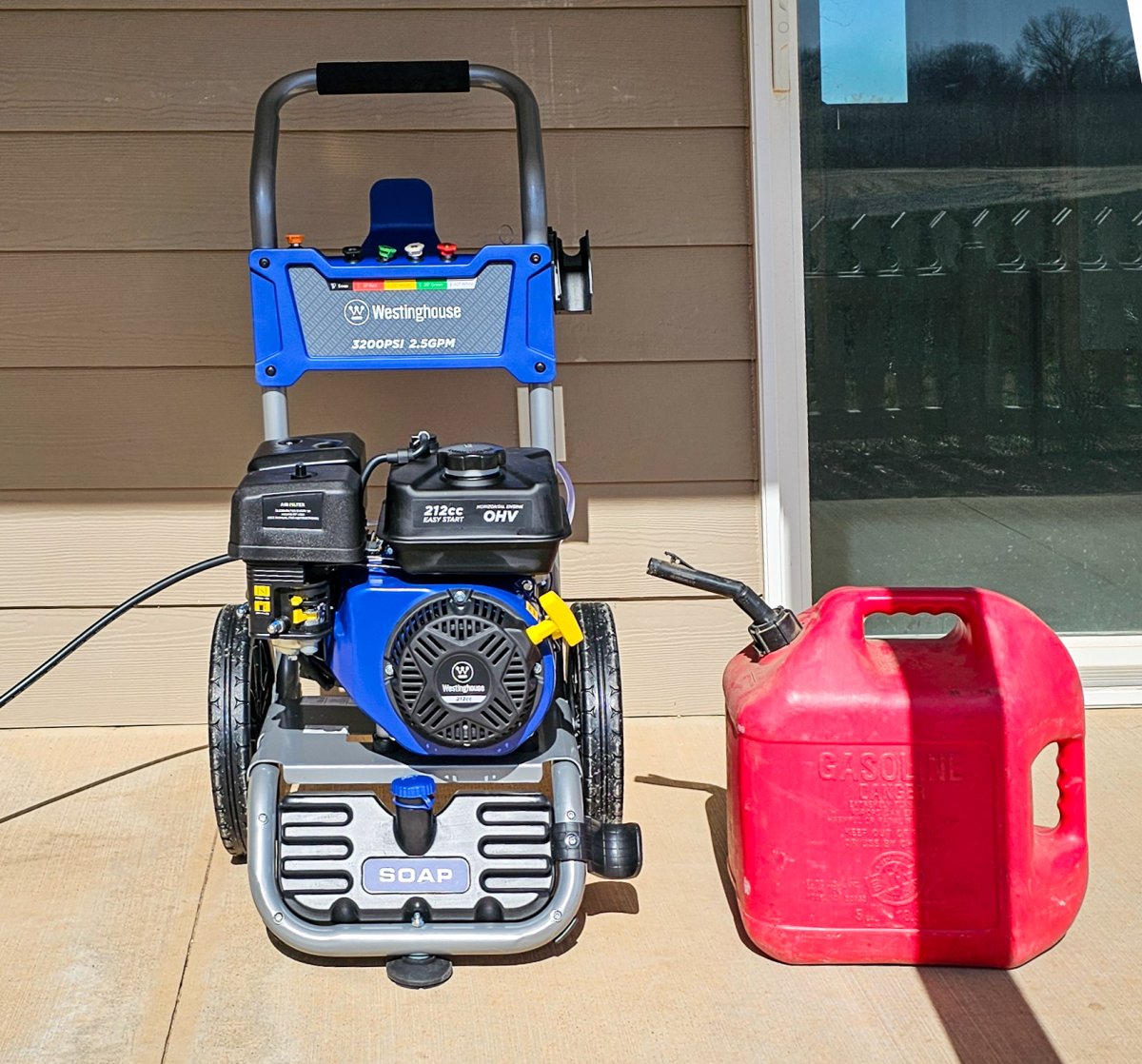
How We Tested the Best Pressure Washers Under $500
We carefully researched more than 35 of the best pressure washers, looking at power, attachments and accessories, and portability features (such as large wheels). We also considered brand reputation and, perhaps most importantly, customer satisfaction. Then we narrowed down our list to include a variety of options based on user needs. After all, some users may only need a light-duty pressure washer, while others need something with more power.
To gauge each product’s capabilities, we set up driveway pressure-washing tests by marking off concrete sections for a timed cleaning comparison. Then, depending on the machine’s maximum listed pressure in pounds per square inch (PSI), we tested them on additional surfaces, such as house siding, windows, and patio furniture. We then rated each power wash machine on its ease of use, performance, durability, and overall value; these seven products were the best-performing washers in our tests.
| Testing Stats | |
| Products tested | 13 |
| Time spent testing | 13 hours |
| Tests performed | 5 |
| Price range | $150 to $499 |
Our Top Picks
Using a pressure washer can help extend the life of many high-ticket items (such as decks, outdoor furniture, and boats) as well as save time and money in the long run. After testing, we found that the following products were the best performers and can meet a variety of needs and budgets.
Best Overall
Westinghouse WPX2700 Pressure Washer
Pros
- Built-in detergent tank makes cleaning easy
- 0.9-gallon gas tank is large enough for most tasks
- Moves an impressive 2.3 GPM; ideal for most home cleaning
- Durable abrasion-resistant hose has long reach
Cons
- Gas-powered pressure washers aren’t eco-friendly
- Large and heavy; may be tricky to move and/or store
Product Specs
- Power: Gas
- Flow rate: 2.3 gallons per minute (GPM)
- Pressure: 2,700 PSI
- Hose length: 25 feet
- Nozzles: 0, 25, and 40 degrees, plus soap
Our Ratings: Ease of Use 4.7/5; Performance 5/5; Maneuverability 4.5/5; Noise 4/5; Value 5/5
The Westinghouse WPX2700 earned high marks in our field tests with its combination of cleaning power, maneuverability, relatively compact footprint, and competitive price.
This gas-powered washer delivers enough water pressure to blast away driveway stains, but not so much as to risk damaging a car’s paint job. Its strong water pressure and a good flow rate make it suitable for most tough outdoor cleaning chores, from washing mold stains off concrete to cleaning windows. We would have preferred pneumatic tires to the Westinghouse’s large plastic wheels, but we found they still offer decent mobility on uneven terrain.
For users who want a dependable, powerful machine, this Westinghouse pressure washer does not disappoint.
Get the Westinghouse pressure washer at Amazon or The Home Depot.
Best Bang for the Buck
Karcher K1700 Cube Electric Pressure Washer
Pros
- Offers good cleaning power in a compact size
- Plenty of reach with a 20-foot electrical cord and a 20-foot high-pressure hose
- Affordable price point
Cons
- Lower PSI can take longer to clean away heavy dirt
- Light-duty connection hardware may not stand up to frequent heavy use
Product Specs
- Power: Corded electric
- Flow rate: 1.2 GPM
- Pressure: 1,700 PSI
- Hose length: 20 feet
- Nozzles: 15 degree, turbo, and soap
Our Ratings: Ease of Use 5/5; Performance 4/5; Portability 5/5; Noise 5/5; Value 4.5/5
For quick and efficient cleaning of mildly dirty items—such as house windows, car exteriors, vinyl siding, and patio furniture—the Karcher K1700 fits the bill. Three quick-connect spray nozzles, an onboard detergent tank, and a convenient on/off foot switch make it versatile and strong enough for tackling light-duty cleaning chores. Its long cord and hose offer plenty of reach for washing second-story windows.
This lightweight, budget pressure washer is built like a tool box and has a carry handle. In our tests, we liked the amount of cleaning power it offered for such a compact size. This would be an excellent choice for RVers and anyone who is tight on storage space.
Get the Karcher pressure washer at Amazon or Tractor Supply Co.
Best Electric
Greenworks 2,300 PSI 2.3 GPM Electric Pressure Washer
Pros
- Large 10-inch wheels move well on all terrain types
- Upright configuration with tall transport handle and comfortable grip make it easy to move
- Flexible 25-foot pressure hose maneuvers easily and provides a long reach
- Onboard soap tank and 5 nozzles for a variety of cleaning projects
Cons
- Bulky frame takes up more storage space
- Lag between triggering and pressurizing takes some getting used to
Product Specs
- Power: Corded electric
- Pressure: 2,300 PSI
- Flow rate: 2.3 GPM
- Hose length: 25 feet
- Nozzles: 15, 25, and 40 degrees, plus turbo and soap
Our Ratings: Ease of Use 4.7/5; Performance 5/5; Maneuverability 4.5/5; Noise 5/5; Value 4.7/5
Those needing more cleaning power for more significant projects like siding, fences, and driveways may want to consider the Greenworks 2,300 PSI electric pressure washer. The higher pressure and flow rates help get the work done faster.
We found the spray wand grip and trigger comfortable to work with. The 25-foot flexible hose was easy to maneuver while cleaning all sides and under the hood of a riding mower. Combined with its 35-foot power cord, this washer has lots of reach. Its biggest downside will mostly impact those short on storage room, as they might find this pressure washer a bit of a space hog.
Get the Greenworks 2,300 PSI electric pressure washer at Amazon or Greenworks.
Best Cordless
Ryobi 2,000 PSI 1.2 GPM Electric Pressure Washer
Pros
- Battery power eliminates toxic fumes and the need to store fuel
- Light-duty but packs a punch for removing dirt, mud, and window messes
- Onboard soap dispenser makes it easy to add power-washer soaps
Cons
- Batteries are sold separately
Product Specs
- Power: Battery
- Flow rate: 1.2 GPM
- Pressure: 2,000 PSI
- Hose length: 25 feet
- Nozzles: turbo, 15 degree, and soap
Our Ratings: Ease of Use 5/5; Performance 4/5; Maneuverability 4.5/5; Noise 5/5; Value 4.7/5
The first thing we noticed about the Ryobi 2,000 PSI power washer was how quiet it was while running. Despite its quiet demeanor, this pressure washer packs a power punch for a 2,000 PSI machine. It effectively cleaned dirt and caked-on mud from concrete and siding. We also used it to clean the windows in a patio door. The pressure was sufficient to clean off smears, dried dog slobbers, and splatters. The soap dispenser is a great perk.
We tested this model with two 40-volt rechargeable batteries (sold separately, unfortunately). We got more than 45 minutes of runtime on a single charge and appreciated the cordless convenience of this great Ryobi pressure washer.
Get the Ryobi pressure washer at The Home Depot.
Best Portable
DeWalt DWPW2100 Electric Jobsite Pressure Washer
Pros
- Nozzle, wand, cord, and hose are all stored in or on the machine
- Roll cage protects the machine from falls and provides extra handles
- Includes wheels and retractable handle and weighs just 24 pounds for great portability
Cons
- Not industrial-strength, but fine for all-around cleaning projects
Product Specs
- Power: Corded electric
- Flow rate: 1.2 GPM
- Pressure: 2,100 PSI
- Hose length: 25 feet
- Nozzles: 15 and 40 degrees, plus turbo and soap
Our Ratings: Ease of Use 5/5; Performance 5/5; Portability 5/5; Noise 4/5; Value 5/5
It’s tough to beat DeWalt’s electric jobsite pressure washer if you’re looking for cleaning power on the go. It weighs just 24 pounds, stores all accessories on board, and protects itself with a roll cage that does double duty as handles.
We tested this pressure washer on concrete, a motorcycle, and patio door windows, removing all of the dirt and mud. It did leave hints of oil stains remaining on the concrete, but it’s not designed to be an industrial-strength machine. However, It’s a durable, versatile, portable pressure washer, and it does that job well.
Get the DeWalt DWPW2100 pressure washer at Ace Hardware, The Home Depot, or Amazon.
Best Compact
Wen PW1900 2,000 PSI 1.6 GPM Electric Pressure Washer
Pros
- Compact unit is easy to load in a car or store in smaller spaces
- Lightweight and easy to carry at about 20 pounds
- Plenty of power for basic chores like washing cars and lawn equipment
- Includes detachable soap tank and built-in nozzle adjustment
Cons
- Lacks onboard storage for the hose, wand, and power cord
- Does not have wheels
Product Specs
- Power: Corded electric
- Flow rate: 1.6 GPM
- Pressure: 2,000 PSI
- Hose length: 16.5 feet
- Nozzles: 1 variable flow
Our Ratings: Ease of Use 5/5; Performance 4/5; Maneuverability 4.5/5; Noise 4/5; Value 4.3/5
This Wen pressure washer produces power to clean a deck or lawn equipment. It’s just under 14 inches tall and 20 pounds, making it easy to move and store. The Wen has a 36-foot power cord and a 16.5-foot hose, so it can clean objects relatively far from an electrical outlet and water source.
Though it has no wheels or place to store the power cord or pressure hose, it proves itself admirably in operation. We found that it offered plenty of water pressure and flow to wash a car, clean patio furniture, or eliminate a driveway stain. We also liked how this small pressure washer was easy to load into a car. It’s best, and surprisingly effective, for small tasks.
Get the Wen electric pressure washer at Lowe’s, Walmart, or Wen.
Also Consider
DeWalt DWPW2400 Electric Pressure Washer
Pros
- Upright configuration and air-filled rubber tires make it easy to maneuver
- Built to last with sturdy hoses, connectors, and other hardware
- Includes a built-in soap tank and 5 nozzles for various projects
Cons
- 1.1 GPM flow rate conserves water but cleans more slowly
- Spray gun does not fit securely in the tool rest, making it cumbersome to transport
Product Specs
- Power: Corded electric
- Pressure: 2,400 PSI
- Flow rate: 1.1 GPM
- Hose length: 25 feet
- Nozzles: 15, 25, and 40 degrees, plus turbo and soap
Our Ratings: Ease of Use 4.3/5; Performance 5/5; Maneuverability 4/5; Noise 4/5; Value 4.3/5
This DeWalt comes equipped with the power and accessories necessary to make cleanup quick and easy. The upright frame and inflatable rubber tires on this DeWalt pressure washer made it easy for us to maneuver around the yard. All its hose connectors and other hardware components felt durable and assembled securely. The 25-foot pressure hose and 35-foot power cord offered a long reach for easy access to water, electrical outlets, and our cleaning projects. Although its flow rate of 1.1 GPM was lower than others, we still found it effective for most projects.
Get the DeWalt DWPW2400 pressure washer at Amazon, Ace Hardware, or Walmart.
Jump to Our Top Picks
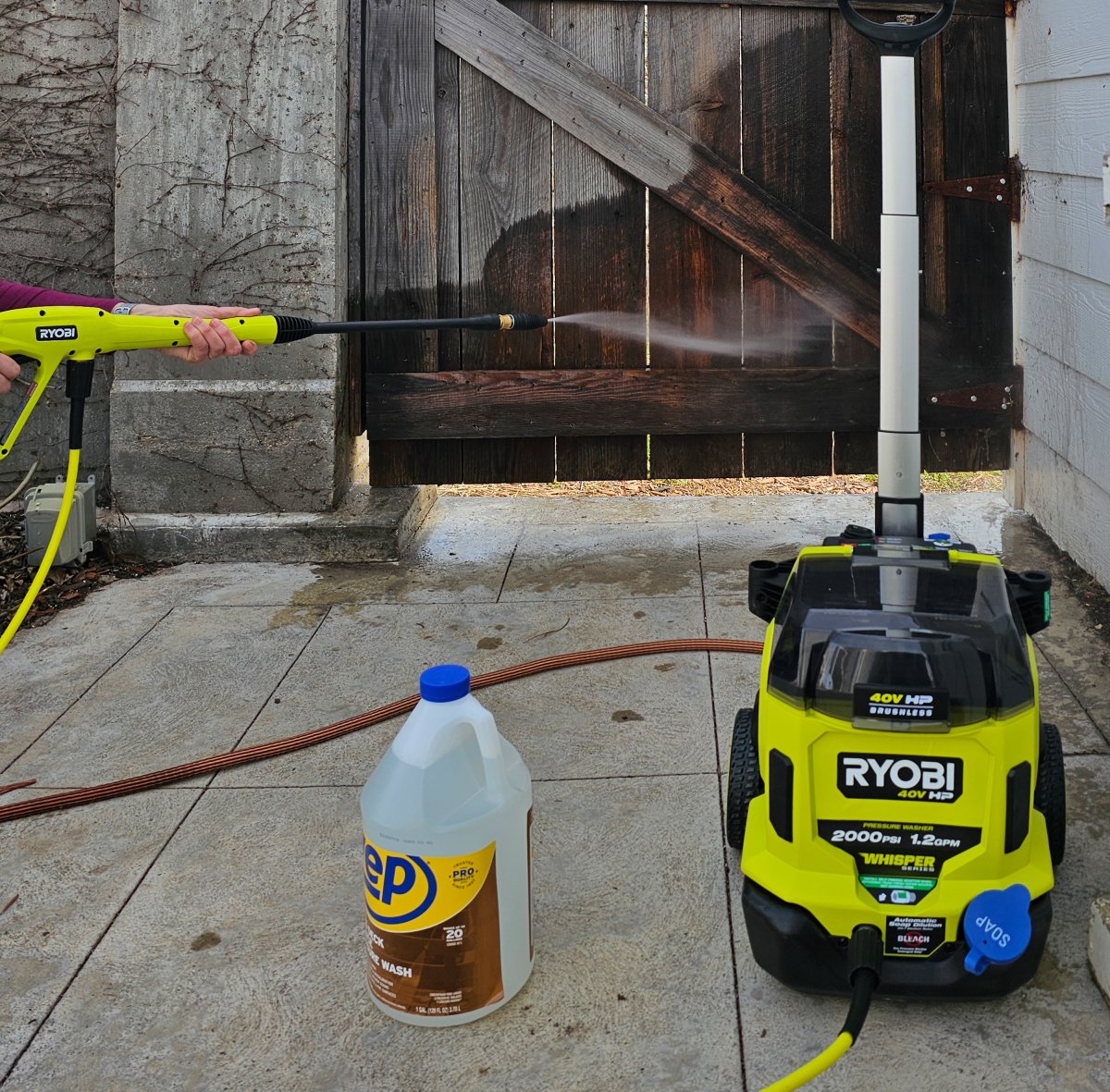
What to Consider When Choosing a Pressure Washer Under $500
Which pressure-washing machine you choose will depend on what you will clean with it. Most importantly, consider type, power, and additional attachments and features.
Type
The three types of pressure washers, gas, electric, and battery, each have their own strengths and weaknesses.
Gas
Your own cleaning needs and preferences will determine whether you choose an electric vs. gas pressure washer. But for the most part gas pressure washers tend to be the most powerful, up to 4,000 PSI for some models, enabling them to handle the toughest jobs. They also tend to be the most durable as they are more likely to include metal parts for the wands and nozzle.
However, there are drawbacks to consider. Gas pressure washers are louder, require more maintenance, and can’t be stored in homes or used in enclosed spots such as garages because of carbon monoxide. They also tend to weigh more because of the gas tank.
Electric
Electric pressure washers can manage smaller jobs and some large jobs, although they may take longer to get the job done because of reduced water pressure of 1,500 to 2,500 PSI. Maintenance is easier and since there’s no exhaust, they can be stored indoors and used in enclosed spots such as garages.
Although they are lighter, the cord length can limit their ability to reach the intended cleaning area. Lower water pressure may increase cleaning time, and parts and wheels are oftentimes made of less-durable plastic.
Battery
Cordless pressure washers are usually powered by a lithium battery, often one that can also conveniently be used for other power tools. Being untethered, battery-operated pressure washers are a great option for dealing with hard-to-reach spots, but the batteries can add weight and have a limited runtime.
GPM, PSI, and Cleaning Power
Two key numbers to consider when purchasing a power washer are GPM and PSI. GPM is the flow of the water measured in gallons per minute (GPM). PSI is the water pressure, measured in pounds per square inch (PSI).
For large jobs, like power-washing a large driveway, choose a power-wash machine with a higher GPM. Surprisingly, a higher GPM may increase water efficiency—although you are using more water, the job takes less time.
A high PSI is important for challenging jobs such as removing engine grime or stripping paint. However, it is important to balance effective cleaning with the increased likelihood that you will damage the object (or yourself) with a higher PSI. In some instances, it is safer to use a lower PSI for a longer time period. Many pressure washers feature settings that allow users to control the PSI. This can also be done by changing nozzle tips or moving closer to the cleaning area.
How much cleaning power one needs, or GPM and PSI, depends on the job. If a job demands focused water pressure, like stripping paint, the machine with the higher PSI should be more effective. If it is a massive job, like pressure-washing a house, the machine with the higher GPM should be more effective.
Nozzles and Additional Features
Many pressure washers include a variety of nozzles to adjust the water stream, whereas some have just a single adjustable nozzle. The stream variants include 0, 15, 25, 40, and 65 degrees, with 0 being narrow and concentrated and 65 being the widest as well as the one used with a cleaning solvent. Some machines also include the foam cannon used for washing vehicles and the turbo nozzle.
In addition to a variety of nozzles, some pressure washers may include soap dispensers, on-board storage, and telescoping wands for added convenience. There are also attachments that can increase a machine’s efficiency such as adjustable pressure regulators, longer hoses, and gutter cleaners.
FAQs
There are many things to consider when choosing the best pressure washer under $500 for your household. Refer to the frequently asked questions below to gain more knowledge to help you make the best selection.
It depends on the job and how fast you want it done. If you’re sprucing up the grill for the summer season, 1,500 PSI is fine. To clean the grime off your deck, you’ll want to look for 2,600 PSI. If you hope to wash down your entire house, 3,000 PSI would be best. Stripping off paint? A high-pressure washer with 4,000 PSI can do the job.
Most manufacturers list a pressure washer lifespan as 5 to 10 years. However, many variables can affect that prediction. How many hours the pressure washer is in service each year will affect its longevity, with many experts considering lifespan as 200 to 500 hours. Type of usage, maintenance, storage, and quality can also play a part.
A good pressure washer PSI is the one that will handle your intended jobs. A model in the 2,000 to 3,000 PSI range will cover all jobs for most households.
For maximum lifespan, a pressure washer requires both everyday maintenance and seasonal care. Be sure to use the proper settings for the job, and don’t allow it to run when not in use or allow it to overheat.
All pressure washers should be completely emptied of solvents and water. Antifreeze specific for pressure washers should be added. For gas machines, add fresh fuel with fuel stabilizer and fresh oil. Batteries should be disconnected and stored indoors. Cover and store the pressure washer with the hose and wand off the ground.
